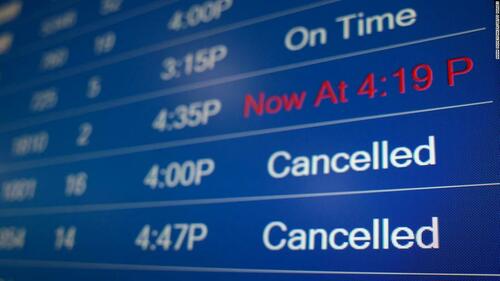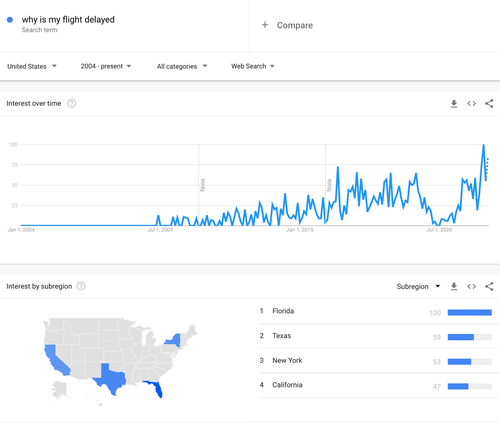
While airlines and the Federal Aviation Administration (FAA) blame each other for soaring flight delays and cancellations that have made traveling across the country a living nightmare, flight disruptions show no signs of abating as the situation worsens ahead of the July Fourth holiday weekend when travel demand will increase.
On Sunday, 6,700 flights were delayed, and nearly 900 were canceled across the US, according to data from FlightAware.
Flight disruptions were particularly disruptive over the Juneteenth and Father's Day weekend when tens of thousands of flights were delayed or canceled -- forcing many to sleep in airports for more than 24 hours.
On Friday, airline industry group Airlines for America, which represents the country's largest airlines (American Airlines, Delta, United, Southwest, JetBlue and Alaska Airlines as well as shippers FedEx and UPS), blamed the FAA's own understaffing is "crippling" East Coast air traffic.
United Airlines recently slashed flights from Newark Liberty International Airport, citing the airport's construction and air traffic control problems.
But it's not just FAA staffing issues and infrastructure woes. Airlines have grappled with pilot shortages after travel demand jumped following the reopening of the economy post-COVID lockdowns. The industry is short 12,000 pilots, United's CEO Scott Kirby recently pointed out. He warned: "there's no quick fix."
To alleviate congestion, United, American Airlines, Southwest Airlines, Delta Air Lines, JetBlue Airways, Alaska Airlines, and Spirit Airlines have all reduced flights this summer. Some carriers are even pulling flights from smaller airports.
The blame for this summer's travel mess in the skies is across the board. Airlines are dealing with a historic pilot shortage, while the FAA doesn't have enough staff amid a very robust demand period for travel despite soaring ticket prices.
Internet searches for "why is my flight delayed" have spiked to a record high amid all the travel chaos.
This means that flight disruptions won't abate anytime soon, though Raymond James analyst Savanthi Syth believes it won't be until later this year when demand simmers down and a significant pullback in 1H23.
While airlines and the Federal Aviation Administration (FAA) blame each other for soaring flight delays and cancellations that have made traveling across the country a living nightmare, flight disruptions show no signs of abating as the situation worsens ahead of the July Fourth holiday weekend when travel demand will increase.
On Sunday, 6,700 flights were delayed, and nearly 900 were canceled across the US, according to data from FlightAware.
Flight disruptions were particularly disruptive over the Juneteenth and Father’s Day weekend when tens of thousands of flights were delayed or canceled — forcing many to sleep in airports for more than 24 hours.
On Friday, airline industry group Airlines for America, which represents the country’s largest airlines (American Airlines, Delta, United, Southwest, JetBlue and Alaska Airlines as well as shippers FedEx and UPS), blamed the FAA’s own understaffing is “crippling” East Coast air traffic.
United Airlines recently slashed flights from Newark Liberty International Airport, citing the airport’s construction and air traffic control problems.
But it’s not just FAA staffing issues and infrastructure woes. Airlines have grappled with pilot shortages after travel demand jumped following the reopening of the economy post-COVID lockdowns. The industry is short 12,000 pilots, United’s CEO Scott Kirby recently pointed out. He warned: “there’s no quick fix.”
To alleviate congestion, United, American Airlines, Southwest Airlines, Delta Air Lines, JetBlue Airways, Alaska Airlines, and Spirit Airlines have all reduced flights this summer. Some carriers are even pulling flights from smaller airports.
The blame for this summer’s travel mess in the skies is across the board. Airlines are dealing with a historic pilot shortage, while the FAA doesn’t have enough staff amid a very robust demand period for travel despite soaring ticket prices.
Internet searches for “why is my flight delayed” have spiked to a record high amid all the travel chaos.
This means that flight disruptions won’t abate anytime soon, though Raymond James analyst Savanthi Syth believes it won’t be until later this year when demand simmers down and a significant pullback in 1H23.







